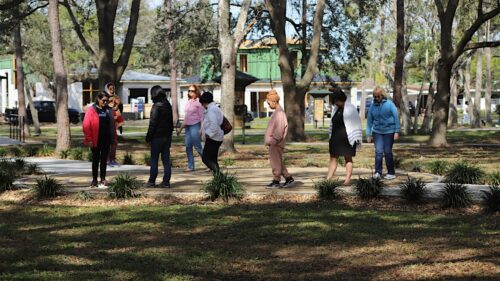Is There an Upside to Stress?
Written by Alison Issen, MS, RN, LMHC.
May is Mental Health Awareness Month. At the Center for Health & Wellbeing, we’re proud to regularly feature Community Education programs designed to support your mental health. One of our regular presenters is Alison Issen, a licensed mental health counselor and registered nurse who has worked in the field of health and wellbeing for more than 35 years.
Click HERE to register for Alison’s program on May 28, Finding Comfort in our Discomfort.
Stress is bad for us, right? We’ve been hearing for years that high levels of stress hormones can take their toll on our cardiovascular and immune systems, as well as our physical, mental, and emotional systems. Recent studies, however, have demonstrated that there is a modifying factor on how debilitating stressors may be, and that involves our perception of stress as friend or foe.
A 2012 study by Harvard University tracked 30,000 adults for eight years and asked two questions: “How much stress have you experienced in the past year?” and “Do you believe stress is harmful for your health?” They then tracked mortality rates of the participants.
Researchers discovered that the people who experienced a lot of stress in the previous year had a 43 percent higher chance of dying, but only if they also believed that stress was harmful for their health. People who experienced a lot of stress but did not view stress as harmful were no more likely to die and actually had a lower risk of dying than those who experienced relatively little stress.
So often, when an unwelcome situation enters our lives, our usual response is to believe this is more than we are capable of handling, leading to feelings of low self-confidence, hopelessness, fear, and even despair. In part, these responses are fed by the physiological release of stress hormones in response to what our brain perceives as a threat to our status quo. But these hormones also increase focus, alertness, and the ability to think-on-our-feet. If we can change our perspective to remember how we have survived many challenges throughout our lives, and review what made those situations worse and what improved them, we may be able to prevent an increase in our panic and worry. To do this, many of us must consciously practice new self-talk, identifying ourselves as capable survivors. In time, this will lay down new neural highways in our brain, that will be more traveled than our old self-defeating talk, and we will more quickly turn problems into challenging new projects.
For more information on changing the perception of stress from dangerous/debilitating to enhancing/challenging, you may want to look at the work of Dr. Kelly McGonigal who wrote The Upside of Stress, and did a TED Talk called How to Make Stress Your Friend HERE.
Another process which has been identified as a positive, multifaceted response to traumatic experiences is Post-Traumatic Growth or PTG. It is defined as “positive psychological change experienced as a result of adversity and other challenges in order to rise to a higher level of functioning.” PTG does not diminish our grief or feelings of distress regarding adversity, but is a process of growing into a different and more positive way of living over time after experiencing extreme difficulty.
Post-Traumatic Growth tends to occur in five general areas:
- An increased sense of gratitude and awe in the present moment
- Making close relationships a greater priority than before and an increased sense of compassion for others who suffer
- A sense that new opportunities have opened up that were not there or were not perceived before
- Recognition of one’s own courage, strengths and abilities
- Some individuals experience a deepening of their spiritual lives. However, this deepening may involve a significant change in one’s belief system.
If you would like to take the PTG Inventory, it can be accessed HERE.
There is no way to live stress-free and life will continue to provide us many opportunities for Post-Traumatic Growth, involving more attentiveness to our relationships, more intentional and purposeful activity, increased gratitude for what is good and beautiful, and recognition of the strength it took to survive these times and maintain our wellbeing.
One of my favorite inspirational readings comes from psychotherapist Elana Rosenbaum, who has survived Lymphoma several times. I read it multiple times the morning I was going in for extensive surgery, and most mornings since surviving that scare. May it bring you inspiration and resolve.
Credo by Elana Rosenbaum
I resolve to dwell in the present and not be captured by fear.
I shall use my experience to remember the preciousness of life and the gifts I have received.
I shall challenge myself to live wisely and make meaning of my experience,
letting it transform me.
I shall work to bring peace to others, so they, too, may be free.
I am filled with gratitude to all who have helped me be alive and well.
May I never forget the grace that has been bestowed upon me.
It is not important what will be tomorrow.
It is important to live today in harmony with myself and others and to use the love I receive to give it out again.
I shall work to maintain a balance, opening to what is true and acting accordingly.
I shall not be ashamed of praise, but value my efforts, appreciate my bravery and celebrate my joy.
May I be able to love, care for my body and spirit, and help others do the same.
May we all be well, and may I live with ease and happiness.
Alison C. Issen has a Master of Science in Clinical Psychology from the University of Central Florida, and is a Licensed Mental Health Counselor, as well as a Registered Nurse. Alison recently retired as the outpatient counselor at Orlando Health/UFHealth Cancer Center. For several years, Alison coordinated the Sage-ing Center, a program that encourages and supports adults of all ages, and particularly those in the second half of life, to inventory, evaluate, and intentionally plan a life of purpose, learning, fulfillment, and community service. Alison brought this comprehensive program to the hospice several years ago and developed Hospice of the Comforter’s Quality of Life Education Program. Alison has taught psychology at the college level and has worked in the field of health and wellness for over 35 years, including over 10 years as a hospice nurse and counselor. Her specialty areas include stress management, grief and loss, end-of-life, aging and relationship issues, Mindfulness-based Cognitive Therapy, and Positive Psychology. Beyond her professional life, Alison is an “extreme gardener,” volunteers at a local animal shelter, and performs with local singing and theatre groups.






